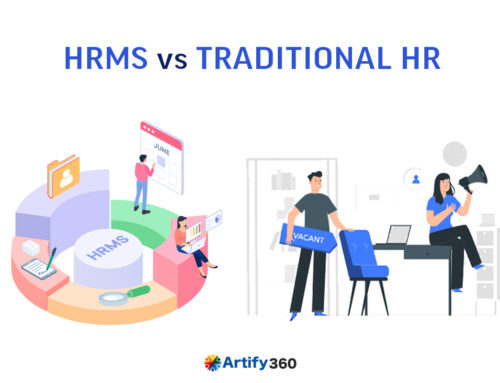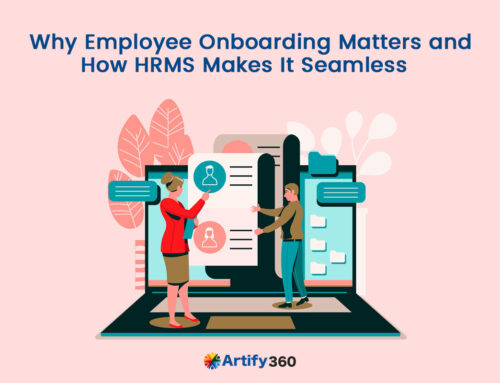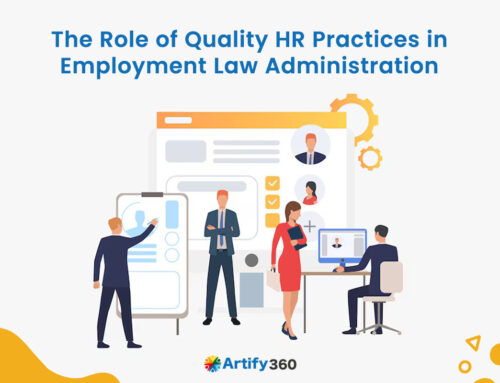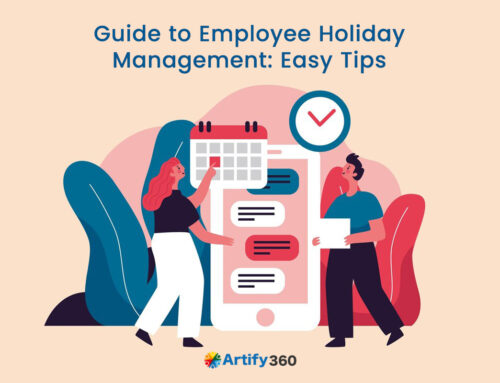Training and developing your staff resources are crucial and urgent HR tasks to enable organizational efficiency. All feasible options should be considered to achieve this target. Leverage them according to the best available conditions in the business.
This space serves as a reminder that the best training and development system for human capital resources includes HRMS solutions. Here, we will learn about how to integrate HRMS with a Learning Management System (LMS) to provide a capable platform for staff training and development.
LMS & Employee Training – All You Need to Know
Before proceeding with the integration details, let’s take a look at the role of LMS in staff training for organizations. LMS is the gift that never pauses its magic if correct optimization is done to meet the organization’s objectives. Alignment is key to developing a full-fledged LMS solution that adds value to your workforce.
Multiple factors become desirable with the implementation of LMS software. The primary factor is the skills development and professional training that an employee receives to help their career. One other factor of note is employee engagement as part of the LMS programs, driving the system towards attaining a harmonious work environment. Automated training systems are also significant in creating a positive work culture that lays the foundation for further business development.
With suitable LMS execution, you can add a wow factor to your employee training programs. Whether it is a base-level resource development program or a chief of staff training schedule, LMS ensures a path forward. A simple yet sophisticated system can be arranged for flexible solutions that your resources can bank on. LMS gives you the option to create custom training modules to help avoid issues with mundane or routine tasks in terms of employee development.
Factors Regarding Integration of LMS with HRMS Solutions
Now, let’s see how the LMS can be integrated with the organization’s HR division to receive the best benefits. The biggest advantage of integration is the creation of an exclusive platform where employees can receive automated support for training. It will allow your resources to seek personalized training support. It will also help them get free, recurring training as per their demand or the company’s requirement.
LMS integration can work in two ways while considering the HRMS route. Either it can be an independent system with its set of automation guidelines and rules, or it can be an in-built module delivered as part of the complete HR software package. Each option has its own merits and drawbacks.
When you use an independent system, it will give space to more democratic procedures related to the employee engagement and training portal. The roles of the system and its compliance/regulatory standards are well-defined. The problem with this is that you need to take care of two different systems, even though they follow a collaborative structure.
If your LMS platform is developed within the HR system as part of an innate service solution, it is the ideal choice. Here, everything related to performance management, employee engagement, database support, and organizational support expresses feasibility. Issues could arise here also owing to a gap in identifying the need for technical assistance and options for customization.
How to Achieve Breakthrough with HRMS & LMS Integration?
The interaction of HRMS and LMS is sure to bring about a whole host of benefits for your organization’s overall performance quotient. We will discuss the points below:
- A big achievement of the HR system’s collaboration with the LMS portal is the personalization feature. Each employee can be uniquely identified and studied, and decisions can be made related to their development training or required upskilling.
- The integration is beneficial from an organizational perspective. Owing to their shared space, you only need to manage one central documented database for both platforms, allowing advantages like cost-efficiency, time savings, and raising intangible values like employee morale.
- Risks are part of the organization’s general functioning journey. But if you have a dedicated system in place where a staff training report can be measured under the HR terms, manual errors or malpractices can be reduced/eliminated. It will lead to the successful execution of risk management in your organization.
- With the systems integration in place, you can analyze the talent and skills of each employee. It will empower you in achieving strategic resource allocation and is a boon to the organization’s mission of realizing smart professional goals in real time.
- Your operational processes will be more valid and productive. If it is a routine process, it will be smoother to execute and manage. As for unique requirements in the domain, you can always innovate a new pathway that will personally help the cause of your business or brand.
- Since your HRMS-LMS integration is an entirely digitized platform, there is scope for improvement in other solutions. Plus, it will enable you to build a robust portal with maximum potential for employee onboarding, retention, and upskilling principles.
- It is better to possess a system in place that might raise your organization’s vibration among employees. The said integration can offer a rewarding experience for your employees. You can set a friendly, positive tone for your company with space for preparation concerning future integration prospects.
- When an employee’s training and development process is covered under the HRMS and LMS interaction, it will provide more analytics, showing a deeper side that can be technically tackled by the HR personnel for the betterment of the organization. Predictive analytics is the keyword here and can be leveraged by using AI tools like intelligence gathering, adaptive learning, and live resource tracking visualization.
- Of all the features in favour of the integration, the one that stands out the most is the potential for continuous improvement and learning available to your employee resources. We cannot overstate the relevance of consistent training in supporting an employee’s profession and career.
- With seamless integration of HR software with eLearning systems, it is feasible to train and develop remote workforce or hybrid resources. There won’t be any confusion from the HR viewpoint, as database documentation is perfect in this scenario.
Novel Digitized Tool from Artify 360 to Integrate Your LMS Portal with HR System
This is where you should know about a dedicated HR software system that enables organizations to achieve ultimate training and development programs. These modules are built within the SaaS suite, making it essential for carrying out core staff training program functions. The name of the software system is Artify 360 – a top-notch services solution in the digital industry, creating waves in the world of HRMS.
Artify360 cloud HR software’s unique platform is structured to accommodate separate modules for employee training and development. It encourages you to perform the administrative task with proper planning. The data recorded regarding past training will be accurate and easily accessible on demand. You can leverage the data by converting those into actionable insights. You can try out the Artify 360 HR payroll software’s training and development assistance module.






